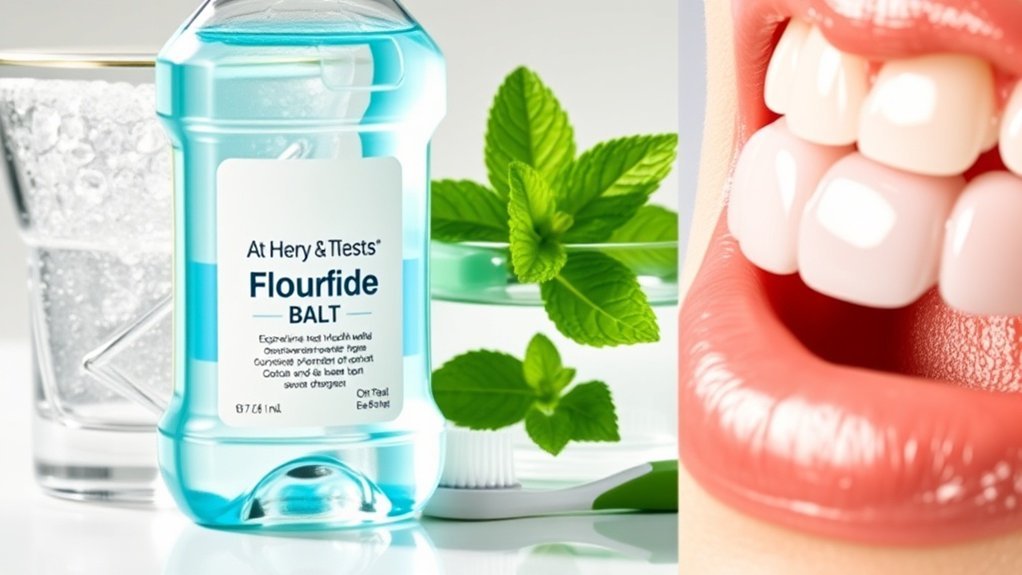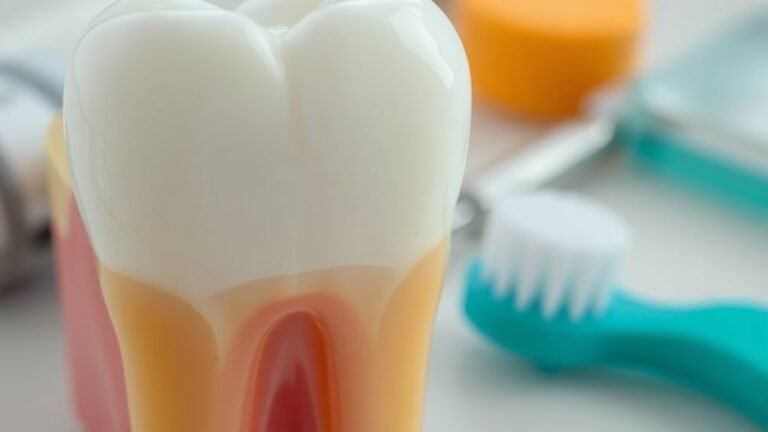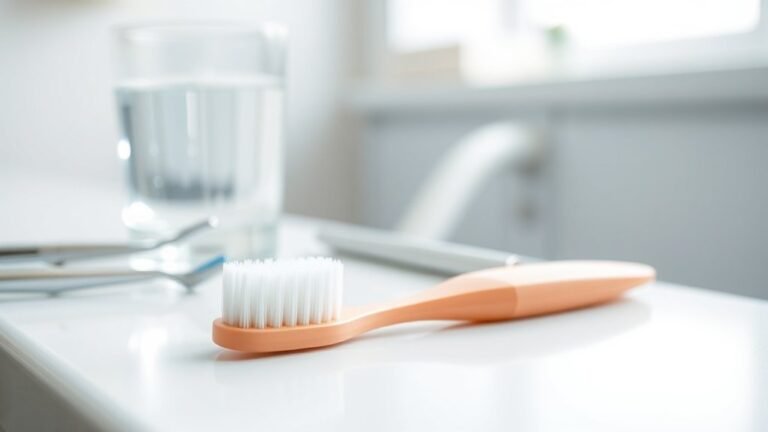Mouthwash With Fluoride Strengthens Tooth Enamel and Reduces Sensitivity
Mouthwash with fluoride is vital for strengthening your tooth enamel and reducing sensitivity. It works by remineralizing weakened enamel, enhancing its resistance to decay, and providing essential minerals. Additionally, fluoride helps block nerve endings to alleviate discomfort from temperature changes. Incorporating fluoride mouthwash into your routine, especially after brushing, maximizes its benefits. To choose the right product for your needs, consider specific goals and consult your dentist for tailored advice. Discover more about its advantages and selection tips.
Key Takeaways
- Fluoride mouthwash remineralizes and strengthens tooth enamel, enhancing its resistance to decay and damage.
- It alleviates tooth sensitivity by fortifying enamel and blocking nerve endings, reducing discomfort during temperature changes.
- Regular use of fluoride rinse contributes to overall dental health, preventing cavities and promoting stronger teeth.
- For optimal results, use fluoride mouthwash after brushing and flossing, avoiding rinsing with water immediately afterward.
- Choose a fluoride mouthwash with ADA Seal of Acceptance for safety and efficacy tailored to your oral hygiene needs.
Understanding Fluoride and Its Benefits for Teeth
Fluoride, a naturally occurring mineral, plays a crucial role in maintaining your dental health. It helps to prevent cavities by remineralizing tooth enamel and inhibiting harmful bacteria in your mouth. Using fluoride mouthwash can be an effective addition to your oral care routine. Unlike regular mouthwashes, fluoride mouthwash specifically targets the protection of your teeth. It not only freshens breath but also delivers concentrated fluoride directly to your enamel, enhancing its strength. Regular use can greatly reduce the risk of decay, especially in individuals prone to cavities. By incorporating fluoride mouthwash into your daily regimen, you’re actively taking steps to safeguard your smile, ensuring your teeth remain healthy and resilient against everyday challenges like sugary foods and acidic beverages.
How Fluoride Mouthwash Strengthens Enamel
Incorporating fluoride mouthwash into your oral care routine directly contributes to the strengthening of tooth enamel. Fluoride works by remineralizing weakened enamel, which enhances its resistance to decay and erosion. When you rinse with fluoride mouthwash, the fluoride ions penetrate the enamel surface, repairing microscopic damage and promoting enamel strengthening. This process helps to rebuild the mineral content of your teeth, making them more robust against acidic attacks from food and beverages. Additionally, fluoride mouthwash can help create a protective barrier, further safeguarding your enamel. By using fluoride mouthwash regularly, you’re actively contributing to the long-term health of your teeth, ensuring they remain strong and resilient against potential threats. Prioritize this simple step for ideal oral health.
Reducing Tooth Sensitivity With Fluoride Rinse
When you experience tooth sensitivity, using a fluoride rinse can considerably alleviate discomfort and strengthen your teeth. This rinse works by providing essential minerals that help fortify enamel and reduce sensitivity. Regular use can lead to significant tooth sensitivity reduction, allowing you to enjoy your favorite foods without pain.
| Benefit | Description | Frequency |
|---|---|---|
| Strengthens Enamel | Fluoride reinforces tooth structure, making it more resistant to decay. | Daily use |
| Reduces Sensitivity | Helps block nerve endings, minimizing discomfort during temperature changes. | Twice daily |
| Freshens Breath | Provides a clean feeling and freshens breath. | After meals |
Incorporating fluoride rinses into your oral care routine can be a game-changer for those dealing with sensitivity.
Incorporating Fluoride Mouthwash Into Your Oral Care Routine
Adding fluoride mouthwash to your oral care routine can greatly enhance your dental health. It’s an effective way to strengthen tooth enamel and reduce sensitivity, making it a valuable addition to your daily regimen. To incorporate it seamlessly, use fluoride mouthwash after brushing and flossing, ensuring you follow the manufacturer’s instructions for best results. Swish the mouthwash for the recommended time, usually 30 seconds to a minute, and avoid rinsing with water afterward to allow the fluoride to penetrate your enamel fully. Regular use helps prevent cavities and promotes overall dental care. Remember to choose a mouthwash that fits your specific needs and consult your dentist if you have questions about integrating fluoride into your routine.
Choosing the Right Fluoride Mouthwash for Your Needs
How do you choose the right fluoride mouthwash for your specific dental needs? First, assess your oral hygiene goals. If you’re dealing with sensitivity, look for a mouthwash specifically formulated to reduce discomfort. For those at higher risk of cavities, select a product with a higher fluoride concentration. Check for the ADA Seal of Acceptance, which guarantees safety and efficacy. Consider your taste preferences, as this can affect your consistency in use. Additionally, if you have specific health conditions, consult with your dentist for tailored recommendations. Finally, remember to use mouthwash as a complement to regular brushing and flossing, not a substitute. Making informed choices will help you achieve the best oral hygiene and protect your smile.
Frequently Asked Questions
Can Children Use Fluoride Mouthwash Safely?
Yes, children can safely use fluoride mouthwash, but it’s essential to supervise them. Make sure they’re old enough to spit it out and not swallow, typically around six years old, to prevent fluoride ingestion.
How Often Should I Use Fluoride Mouthwash?
You should use fluoride mouthwash twice daily for ideal results. Rinse after brushing your teeth in the morning and evening. Avoid eating or drinking for at least 30 minutes afterward to maximize fluoride benefits.
Is Fluoride Mouthwash Safe During Pregnancy?
Yes, fluoride mouthwash is generally safe during pregnancy. However, it’s best to consult your healthcare provider to guarantee it aligns with your specific health needs and to discuss any concerns about fluoride intake.
Can Fluoride Mouthwash Replace Regular Toothpaste?
Fluoride mouthwash can’t fully replace regular toothpaste. While it aids in strengthening enamel and reducing cavities, it lacks the abrasives necessary for effective plaque removal. Use both for ideal oral health and protection.
What Are the Side Effects of Fluoride Mouthwash?
“An ounce of prevention is worth a pound of cure.” Using fluoride mouthwash can lead to side effects like tooth discoloration, increased tartar buildup, or gastrointestinal issues if ingested. Always follow usage instructions for best results.
Conclusion
Incorporating fluoride mouthwash into your daily routine could be the game-changer your oral health needs. Imagine the confidence of stronger enamel and reduced sensitivity, transforming your smile. But what if you’re missing out on the right product? Choosing the perfect fluoride mouthwash tailored to your needs might just hold the key to revealing a healthier mouth. Don’t wait—discover how a simple rinse can make a significant difference, leaving you enthusiastic to show off your dazzling, pain-free smile.






